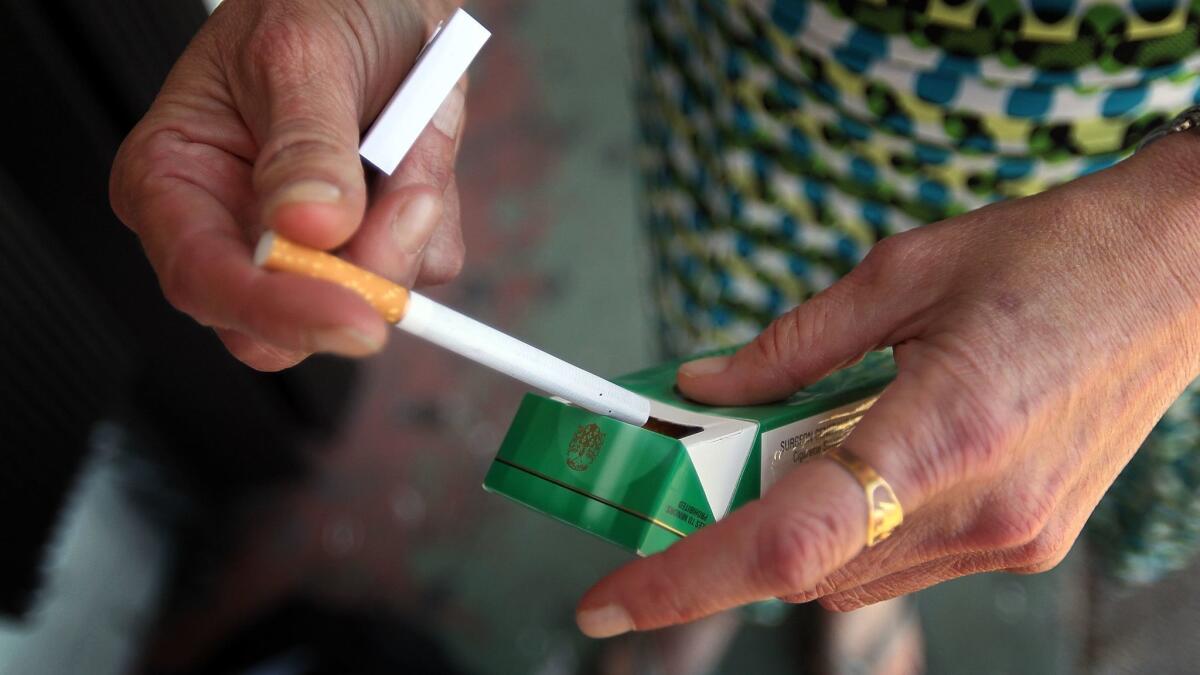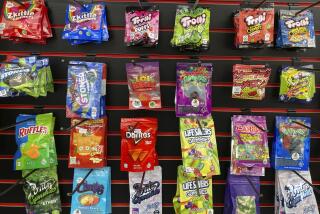Q&A: The FDA is taking aim at menthol and other tobacco flavorings. Here’s why that may be tricky

The Food & Drug Administration this week announced new initiatives aimed at stemming the increase in young Americans’ use of tobacco and its primary psychoactive agent, nicotine.
The object of FDA Commissioner Scott Gottlieb’s ire was flavorings — those minty, sweet, nutty or even salty flavors that cigarette and e-cigarette manufacturers add to their products to make them more enticing.
The prime market for those flavors, Gottlieb said, is no secret: While fewer than one-third of adults over 35 smoke mentholated cigarettes, “menthols” are the choice of 54% of children too young to buy cigarettes legally, but who acknowledge they smoke anyway.
At the same time, 3.6 million high school and middle school students surveyed in 2018 said they used e-cigarettes in the last 30 days — a 78% increase since 2017 that Gottlieb blamed on the enticement of flavorings ranging from cola and chocolate to bubble gum and coffee latte. And, of course, menthol, a flavoring derived from peppermint oil.
“These data shock my conscience,” he said.
With that, he pledged to exercise a stronger regulatory hand over the use of flavorings in e-cigarettes and to crack down on retailers that sell tobacco products to minors.
He also opened a new front in the tobacco war with a proposal to ban the use of menthol entirely in all products that are burned or smoked. That includes cigarettes, cigars and pipe tobacco.
All of which raises some questions:
Can he do that?
It’s not entirely clear whether the FDA has the power to ban menthol in cigarettes.
The 2009 Family Smoking Prevention and Tobacco Control Act gives the agency the authority to establish tobacco product standards “where appropriate for the protection of the public health,” including “provisions respecting the construction, components, ingredients, additives.”
By all appearances, that would allow the FDA to prohibit the use of certain flavorings, including menthol. The 2009 law went ahead and did just that, banning the use of “characterizing flavors” in cigarettes — those used to give a product a distinctive taste and marketing appeal.
But it made an exception in the case of menthol.
What about menthol in e-cigarettes?
Unanticipated by the landmark Tobacco Control Act, the delivery of nicotine by electronically heated dispensers — vaping — became a multibillion-dollar industry in which flavorings, including menthol, have flourished.
The FDA has asserted its authority to regulate e-cigarettes and their flavorings. That claim is furiously contested but hasn’t yet been struck down by the courts.
Gottlieb said this week that while he’s ready to ban menthol as a flavor enhancer in smoked products, he wants to keep it available for e-cigarettes because many older users like it, and he doesn’t want them to go back to smoking menthols.
When it comes to vaping, Gottlieb said he wants to concentrate on kid-oriented flavorings. But he warned that if he sees more evidence that menthol is luring uninitiated kids to e-cigarettes, he would revisit the possibility of restricting it there too.
In the end, new congressional authority may be necessary if the FDA is to ban menthol or restrict the use of flavorings in e-cigarettes. Alternatively, the FDA could simply act, get sued, and let the courts decide whether and how much it authority it has to take such actions.
Any way you look at it, this process will take years to work itself out, said Will Woodlee, a partner with the law firm Kleinfeld, Kaplan & Becker LLC, which has represented a wide range of tobacco and e-cigarette companies in their dealings with the FDA.
Who uses menthol?
Back in 2011, an advisory board to the FDA estimated there were roughly 14 million Americans who smoke mentholated tobacco.
Dominated by such brands as Kool, Salem and Newport, “menthols” are especially appealing to new smokers. But longtime users are among the least likely smokers to quit, research has found.
Menthols are particularly appealing to African Americans and Latinos. About 30% of non-Hispanic white smokers choose mentholated cigarettes, as do more than 70% of black smokers and 37% of Latino smokers.
For years, mentholated tobacco manufacturers advertised heavily in magazines aimed at African American audiences, harking back to themes of the civil rights era. Through their philanthropic arms, they have been lavish contributors to leadership organizations, charities and campaigns embraced by black customers.
Women and LGBT people also favor mentholated cigarettes disproportionately, and they’ve been targeted by marketing campaigns as well.
What about kids?
Among kids 12 to 17 years old who smoke, 54% smoke mentholated cigarettes. Young adults 19 to 25 are right behind them: 50% smoke menthols. And indeed, the FDA’s initiative appears to be highly focused on the role of menthol in drawing adolescents into a smoking habit.
For new or younger smokers, “the primary advantage of smoking a menthol cigarette is that the menthol masks the harshness and discomfort of inhaling smoke enough to allow delivery of an effective dose of nicotine,” wrote the authors of a 2008 study.
Adolescents and young adults were significantly more likely to smoke menthol cigarettes than were older smokers, they found.
These researchers combed through a trove of internal tobacco industry documents to reveal how companies “manipulated menthol levels in cigarettes and introduced new menthol brands to gain market share, particularly among adolescents and young adults.” They brought younger customers in with light menthol flavor, and devised more heavily mentholated brands for older smokers who wanted a stronger taste.
Is menthol inherently dangerous?
Apparently not. A 2013 FDA report concluded that “menthol in cigarettes is not associated with increased or decreased smoke toxicity.”
But there is mounting evidence to suggest that the addition of menthol makes nicotine more addictive.
George Mason University researcher Nadine Kabbani notes that nicotine addiction is not just a matter of getting hooked as a young person. It also depends on sustaining the habit, failing to quit, and relapsing after a quit attempt. On all those fronts, she said, smokers of menthol cigarettes appear to be at a disadvantage.
Kabbani said that she and other researchers are finding that menthol appears to activate receptors in cells that magnify the effects — possibly the addictive effects — of nicotine.
“Is the amount of menthol in a single menthol cigarette enough to increase nicotine in the body or to make it more addictive?” Kabbani said. “That’s the million-dollar question.”
What would happen if menthol cigarettes were banned?
There’s plenty of reason to believe that many smokers would quit and would-be smokers wouldn’t start.
A 2010 survey conducted by the National Cancer Institute found that 39% of menthol smokers said they would quit if menthol cigarettes were no longer available. That includes 47% of African American menthol smokers and 42% of women menthol smokers.
Has the FDA tried to ban menthol or other flavorings before?
Yes. A number of fitful efforts in this direction have been made. So far, none have succeeded.
In 2011, an FDA advisory panel concluded that the removal of menthol cigarettes from the U.S. market would benefit public health — a key step in asserting the FDA’s authority to act.
The effort was quickly met with a lawsuit from tobacco giant Lorillard and by an amendment to the 2012 agriculture appropriations bill that would have severely hobbled the FDA’s powers to regulate tobacco.
The amendment didn’t make it into law, and the lawsuit managed to tie the FDA’s hands only briefly before it was overturned. But their message to the FDA was clear: Back off on menthol.
Nevertheless, the FDA persisted. In 2013, the FDA proposed to act on menthol cigarettes and, in 2016, to limit flavored tobacco products in e-cigarettes. In both cases, the FDA argued that they appear to lower barriers to nicotine addiction for adolescents and young adults. However, the Obama administration blocked both actions.
In May of this year, the FDA requested comments on the role that flavors, including menthol, play in the initiation, use and cessation of tobacco products, especially among youths. And it asked whether and how certain flavors might help adult smokers switch to potentially less harmful products.
For six months, Gottlieb and his agency have gotten an earful from tobacco companies, the vaping industry, anti-smoking activists and researchers. His announcement this week that his agency “will advance a Notice of Proposed Rulemaking” on menthol in smoked products marks the next step on a march down the path of the FDA reasserting, once more, its authority to regulate menthol in cigarettes and flavorings in tobacco.
Why has it taken so long to crack down on menthol?
In addition to the legal uncertainties, some in the African American community have fought a ban as well. With encouragement and funding from tobacco manufacturers, the Congress of Racial Equality, the National Black Chamber of Commerce and the National Organization of Black Law Enforcement Executives argued in 2010 that an outright ban on menthol cigarettes would create a black market and increase violence and street crime in low-income communities already struggling with both.
The National Assn. for the Advancement of Colored People, or NAACP, joined ranks with the American Legacy Foundation, an anti-smoking group, in calling for a ban on menthol.
The tobacco industry’s “very, very clever and effective marketing” has convinced some African Americans that they would be hurt by a menthol ban, said Dr. Georges Benjamin, executive director of the American Public Health Assn.
Tobacco firms “actually went as far as to say that minorities would be unfairly targeted by not having the opportunity to be poisoned by a very addictive substance,” said Benjamin, who supports Gottlieb’s efforts. “These arguments don’t pass the laugh test.”







